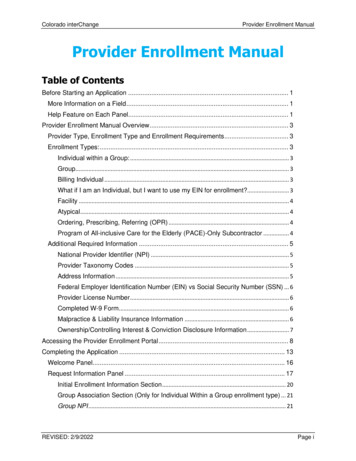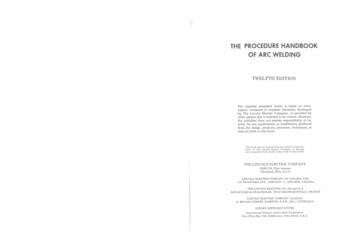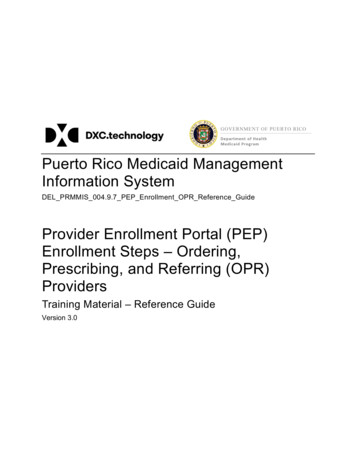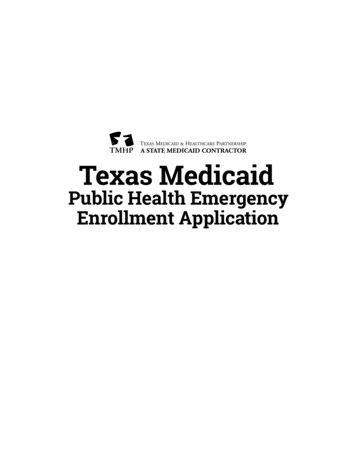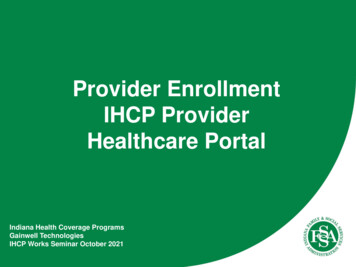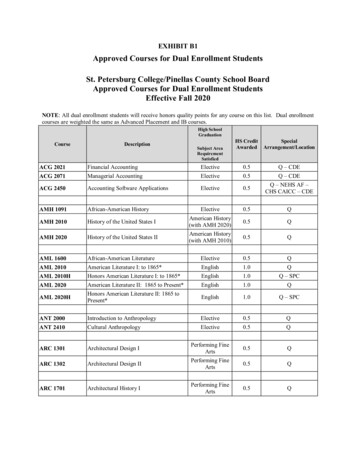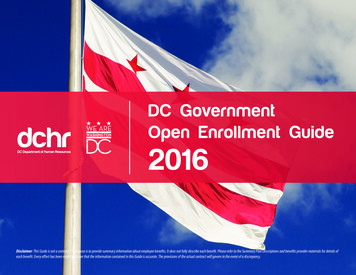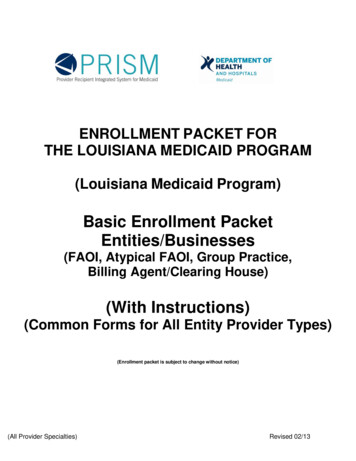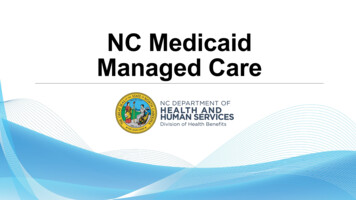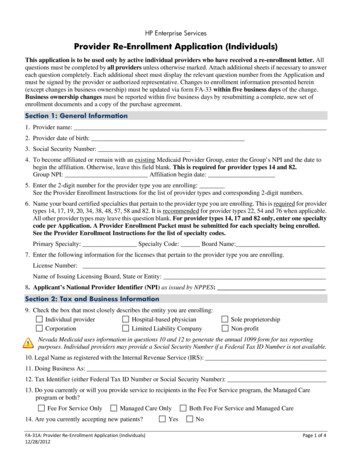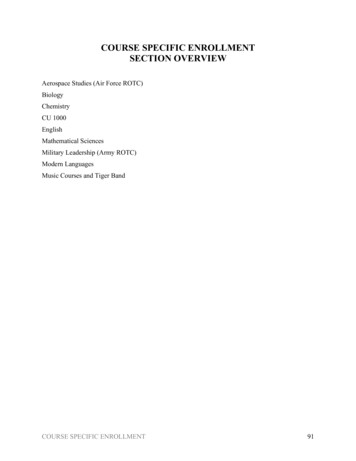
Transcription
COURSE SPECIFIC ENROLLMENTSECTION OVERVIEWAerospace Studies (Air Force ROTC)BiologyChemistryCU 1000EnglishMathematical SciencesMilitary Leadership (Army ROTC)Modern LanguagesMusic Courses and Tiger BandCOURSE SPECIFIC ENROLLMENT91
AEROSPACE STUDIES (AIR FORCE ROTC)CONTACT: Major Wayne Leneau, Director of Operations, nts/air-rotc/index.html/FRESHMAN/NEW STUDENT ORIENTATION SESSIONFreshman/New Student Orientation is typically held on the Sunday prior to the first day of classes inthe fall semester. Students who wish to participate in Air Force ROTC (AFROTC) should send anemail with their contact information to AFROTCDET770-L@LISTS.CLEMSON.EDU at least oneweek prior to orientation to receive more detailed information. Students are also welcome to contactthe department at 864-656-3254 with questions about Air Force ROTC or to make an appointmentwith a member of our staff. Students who wish to enter AFROTC after the beginning of fall classesshould contact the department for specific instructions. Transfer students (or students who havealready attended Clemson for more than one semester) who wish to join the Air Force ROTCprogram should contact an AFROTC faculty member at 864-656-3254 for individual guidance. Ingeneral, students need a minimum of six full-time semesters to complete the AFROTC program(eight full-time semesters are preferred).SCHOLARSHIPSIn-college scholarship opportunities are available for Air Force ROTC cadets. Requirements foreligibility for an in-college scholarship are subject to change, but normally include: cumulative GPAof 3.00 or better (includes all college-level coursework), SAT score (math and verbal sections only)of 1180 or better OR ACT score of 26 or better, passing score on an Air Force fitness test, andcompletion of a certified Department of Defense physical exam.REGISTERING FOR AIR FORCE ROTC COURSESAir Force ROTC courses are open to all students who wish to seek a commission as a secondlieutenant in the US Air Force upon graduation. Participation in Air Force ROTC requiresregistering for the applicable academic course and leadership laboratory each semester as well asattending two physical training sessions per week during the academic year. Students havingdifficulty registering for Air Force ROTC courses should be referred to the Department of AerospaceStudies in 300 Tillman Hall. Incoming freshmen for the fall semester will need to register for AS1090 (class) and AS1091 (lab).ACADEMIC REQUIREMENTS FOR AFROTC CADETSCadets who successfully complete the AFROTC program will earn a minor in Aerospace Studiesupon graduation. All cadets must declare a major area of study upon entry into AFROTC. The AirForce prefers STEM degrees, but the student’s declared major can be any accredited major offeredby the University. Upon enrollment in AFROTC, students are assigned a specific Date ofCommissioning/Date of Graduation (DOC/DOG) by the Air Force. The DOC/DOG ensures the AirForce complies with its officer accession requirements and meets its Congressionally mandated endstrength. Cadets who cannot graduate by their assigned DOC/DOG risk disenrollment from theAFROTC program and may have to repay any scholarship and/or stipend monies received.In general, cadets must complete their academic degrees within eight semesters. However, AFROTCadds 24 credit hours to a student’s academic plan. To accommodate this increased academicworkload, the Air Force permits cadets enrolled in certain majors to take up to 10 semesters to earn adegree. The Air Force-approved “five-year” majors are as follows:COURSE SPECIFIC ENROLLMENT92
TECHNICALArchitectureComputer ScienceMathematicsMeteorology(Atmospheric ering stronauticalIndustrialNON-TECHNICALBusiness Administration **Economics **Foreign Area Studies **Foreign Language **ChemicalCivilComputerElectricalEngineering PhysicsManagement temsMaterials Scienceand EngineeringCeramic** Cadets in these majors must have also completed the following courses: Calculus I & II (or amath minor), Statistics I, and Operations Research/Management Science. The Calculus andStatistics courses must come from the school’s Mathematics (or equivalent) Department (notBusiness, Social Sciences, etc.).The Department of Aerospace Studies highly recommends that students enrolled in a technical orengineering major plan on completing their degrees in either 9 (at a minimum) or 10 semesters.ADVISING REQUIREMENTS FOR AFROTC CADETSTo ensure cadets meet Air Force requirements and remain on track for graduation/commissioning,they are required to fill out an Air Force Form 48 (Planned Academic Program) every semester theyare enrolled in AFROTC, and they must meet with a member of the AFROTC faculty to review thisform. The Form 48 lists, by semester, all courses taken and scheduled to be taken by the cadet. PerAir Force requirements, Forms 48 must be reviewed and signed off by an advisor in the cadet’smajor degree program under the following circumstances:1. During the fall term of every academic year2. The cadet changes majors3. The cadet makes significant changes to his/her current academic planWhen reviewing the Form 48, advisors should understand the following:1. Advisor signatures are required in two places: on the front of the form (Block 4) and in thecurrent semester block (e.g., if reviewing the fall 2017 semester, the advisor should also signin the “University Advisor’s Signature” block in the fall 2017 semester). See figure on pageIII-22.2. The advisor’s signature means only (1) that the advisor has reviewed the academic plan and(2) that the cadet will graduate by the DOC/DOG listed in Block 5 as long as the cadetsuccessfully completes the listed courses of study. Ultimately, it is the cadet’s responsibilityto ensure the Form 48 is correct/complete and to graduate on time.3. Advisors are not expected nor required to fill out the Form 48 for cadets. Instead, cadetsshould come to the meeting with a proposed course of study. The advisor should advise thestudent regarding the feasibility of their proposed plan and, if needed, recommendmodifications.COURSE SPECIFIC ENROLLMENT93
4. Advisors should reject claims of short-notice deadlines made by cadets (e.g., “I need myForm 48 filled out in one hour to meet Air Force requirements.”) Cadets are well aware ofthe Form 48 requirement and are given ample time to schedule an appointment and meet withan advisor in advance. In the event a cadet cannot meet with an advisor prior to the Form 48suspense date due to advisor workload/availability, AFROTC faculty will grant the cadet anextension.5. Air Force cadets are required to attend Field Training during the summer between theirsophomore and junior years. In general, summer classes and internships should not bescheduled during this time to ensure the cadet can fulfill this mandatory Air Forcerequirement.Advisor Signature HereMONTH/YEAR OFGRADUATIONHERETRANSFER CREDITSClassClassClassClassTRANSFER CREDITSClassClassClassClassCURRENT visor Signature HereFUTURE SEMESTERClassClassClassClassCOURSE SPECIFIC ENROLLMENTFUTURE SEMESTERClassClassClassClass94
BIOLOGYCONTACT: Londan Charley, Director of Academic Advising, LONDANM, 656-3604, 124 LongBIOL 1200 SERIESThese courses are designed for students in non-science majors. The purpose of these courses is todeepen students' understanding of selected topics in biology that directly affect them; to broaden theirperspective on the scientific enterprise, including an understanding of the process of scientificinquiry; and to prepare them to analyze science-related issues as consumers and voters.To meet the one-semester general education requirement for natural science with lab, students enrollin BIOL 1230 in combination with the lab, BIOL 1200.To meet the 3-credit math or natural science requirement for math or natural science, students whodon't complete BIOL 1230 and BIOL 1200 for the 4-credit natural science with lab requirement maytake BIOL 1230 lecture without the BIOL 1200 lab.BIOL 1200 – Biological Inquiry Lab – 1 (0, 3). Required laboratory experience toaccompany BIOL 1220 or 1230. Focuses on the process and outcomes of scientific inquiry.Students employ scientific methodology in a laboratory environment as well as criticalanalysis of biological problems in a small-group context. Coreq: BIOL 1220 or 1230.BIOL 1230 – Keys to Human Biology– 3 (3,0 ). Introduction to scientific inquiry throughhuman biology. Considers biological processes occurring within humans and human impacton global biological processes. Interrelationships ultimately affecting evolution and diversityare explored. Credit toward a degree will be given for only one of BIOL 1220 or 1230.Note: Professional schools (e.g., medical, pharmacy, dental, veterinary, etc.) will not accept thesecourses as fulfilling their biology requirement.BIOL 1030/1050 and BIOL 1040/1060These courses are intended to fulfill general education or curricular requirements for studentsenrolled in science and health-related curricula, including the natural sciences, agriculture, forestry,science teaching, or health-related disciplines. Professional schools (e.g., medical, pharmacy, dental,veterinary, etc.) will accept BIOL1030/1050 plus BIOL 1040/1060 as fulfilling their biologyrequirements. However, BIOL 1100 plus BIOL 1110 are the recommended courses for BiologicalSciences, Microbiology, Genetics, and Biochemistry majors.BIOL 1030 General Biology I 3(3, 0) First course in a two-semester sequence. Includes anevolutionary approach to cells, cellular activities, genetics, and animal diversity, emphasizingthe processes of science. Credit toward a degree will be given for BIOL 1030 or 1100 only.Includes Honors sections.BIOL 1050 General Biology Lab I 1(0, 3) Laboratory to accompany BIOL 1030. Emphasis ison developing laboratory techniques, becoming familiar with biological instrumentation, andperforming investigations and interpreting results in the areas of biochemistry, cell biology,molecular biology, and genetics. Prereq or concurrent enrollment: BIOL 1030.COURSE SPECIFIC ENROLLMENT95
BIOL 1040 General Biology II 3(3, 0) Continuation of BIOL 1030. Includes an evolutionaryapproach to human anatomy and physiology, plant diversity, morphology, and physiologyand principles of ecology. Credit toward a degree will be given for BIOL 1040 or BIOL 1110only. Includes Honors sections. Preq: BIOL 1030 and BIOL 1050; or BIOL 1100.BIOL 1060 General Biology Lab II 1(0,3) Laboratory to accompany BIOL 1040. Emphasizesdeveloping laboratory techniques, becoming familiar with biological instrumentation, andperforming investigations and interpreting results in the areas of organismal structure,physiology, and ecology. Preq or concurrent enrollment: BIOL 1040.BIOL 1100 and BIOL 1110This course sequence is the recommended introductory biology sequence for students majoring inBiological Sciences, Biochemistry, Genetics, or Microbiology. Professional schools, e.g.,medical, pharmacy, dental and veterinary, will accept BIOL 1100 plus BIOL 1110 as fulfilling theirbiology requirement.BIOL 1100 Principles of Biology I 4 (3,3) Introductory course designed for studentsmajoring in biological disciplines. Integrates lecture and laboratory and emphasizes amodern, quantitative, and experimental approach to explanations of structure, composition,dynamics, interactions, and evolution of cells and organisms. High school chemistry isrecommended. Credit toward a degree will be given for either BIOL 1100 or 1030. IncludesHonors sections. Coreq: BIOL 1101.BIOL 1110 Principles of Biology II 4 (3,3) Continuation of BIOL 1100, emphasizing thestudy of plants and animals as functional organisms and the principles of ecology. Credittoward a degree will be given for BIOL 1110 or BIOL 1040 only. Includes Honors sections.Preq: BIOL 1100. Coreq: BIOL 1111.Note: Credit toward a degree will be given for either BIOL 1030/1050 or 1100 and for either BIOL1040/1060 or 1110.COURSE SPECIFIC ENROLLMENT96
CHEMISTRYCONTACT: Dennis Taylor, Director of General Chemistry, DFTAY, 656-2680 or Kris Coleman,Registration Coordinator, KCOLEM3, 656-3089CH 1010 PREREQUISITE/CO-REQUISITETo enroll in CH 1010, students should meet at least one of the following criteria: SAT Math Score 640 or ACT Math Score 27 or Grade of “P” in CH 1040 or MATH 1050 or C or better in MATH 1010 or MATH 1020 or MATH 1030 or Concurrent enrollment in MATH 1040, 1060, 1080, 2060, 2080, or STAT 2300. CMPT of 60 or higher is acceptable; however, it will require a prerequisite override.These requirements are intended to ensure that students enrolling in CH 1010 are adequatelyprepared for the course and have a reasonable chance of earning a “B” or better in the course whichis important for scholarship reasons.CH 1010 SECTION RESTRICTIONSCH 1010 Sections Nos.001 to 015050071 & 072RestrictionNo restrictions – anyone can add!Chemistry students onlyHonors students onlyHOLDING SECTIONS FOR PENDING CREDITFor a student with pending AP credit or transfer work from another institution, the following holdinglecture sections have been created:Fall 2020 Chemistry CourseCH 1020 (section 999)CRN for Holding Section88817What is a holding section?A holding section is a faux section designed to provide us with a clear list of students who will needthe course in the fall but do not currently meet the prerequisite. Registration Services has graciouslystripped these particular sections of the prerequisite requirements. In return, the department hasguaranteed that all students in a holding section will get a real seat upon meeting the courseprerequisites.What is the purpose of the holding sections?These sections were created for two reasons:1. Students can still secure a real seat in a real lab in fall 2019.2. Students can add themselves to the lecture that best fits their schedule once prerequisites arerecognized by iROAR.What about lab?When iROAR sees that the student is enrolled in a section of the lecture (in this case a holdingsection), it will then allow the student to add the lab section (a real lab section). These are real seatsin a real lab that really meets in fall 2019.COURSE SPECIFIC ENROLLMENT97
When will students be added to a real lecture section?Upon Clemson’s receipt of official IB credit or AP credit, students should be able to movethemselves in iROAR once the prerequisite credit is processed and entered into iROAR.What if the student’s prerequisite proof has not been processed by Friday, August 7, 2020?Students who have not provided prerequisite proof by Friday, August 7, 2020 will be dropped fromthe CH holding section AND the corresponding CH lab. To apply for an extension of the deadline, astudent needs to contact Kris Coleman (KCOLEM3, 656-3089) with an explanation. Such requestswill be evaluated on a case-by-case basis.CHEMISTRY LECTURE AND LABORATORY RELATIONSHIPGeneral Chemistry lecture and lab, CH 1010/CH 1011 and CH 1020/1021, are co-requisites. Astudent enrolled in one must be enrolled in the other. A student who drops the lecture will be droppedfrom the lab and vice-versa.Organic Chemistry lecture, CH 2230 or CH 2240, may be taken independently of the lab, CH 2270or CH 2280. However, enrollment in the lab courses requires concurrent enrollment in theappropriate lecture or previous credit for the appropriate lecture. A student who is enrolled in bothlecture and lab (CH 2230/CH 2270 or CH 2240/CH 2280) will be dropped from lab if he/shewithdraws from the lecture. If the CH 2270 or CH 2280 lab is dropped, the student may remain in theCH 2230 or CH 2240 lecture.Note: Chemistry sections will be capped as follows:CH Course/SectionCH 1010 001 – 015CH 1050CH 2010Student Enrollment Cap120 students110 students110 studentsIf students cannot register for chemistry in the Fall 2020 semester, please encourage them to waituntil Spring 2021 or Summer 2021 to enroll.COURSE SPECIFIC ENROLLMENT98
CU 1000CONTACT: Sue Whorton, WHORTON, 656-6211www.clemson.edu/ascCU 1000 is a zero-credit, pass/no pass course that all new Clemson students are required to completeduring their first semester of enrollment. The purpose of CU 1000 is to introduce new students toClemson’s student success resources and community standards and values. CU 1000 is a hybridcourse – students complete two modules in person and the remaining seven modules online. Courseassignments are completed and submitted in Canvas, Clemson’s online learning management system. All new students are required to enroll in CU 1000Students register for CU 1000 during their new student orientation sessionThe course syllabus and assignments are in CanvasRequired CU 1000 modules:1. Academic Advising (online; 30 minutes) – instruction on academic advising-relatedprocesses, policies and expectations2. Aspire to Be Well (in-person; 70 minutes) – interactive dialogue exploring personalwellness and safety3. Community Dialogue (in-person; 90 minutes) – interactive dialogue exploringClemson's core value of respect, the significance and salience of social identity, andthe differences between dialogue and debate.4. Community Standards (online; 3 hours) – instruction on Clemson’s student code ofconduct, sexual assault prevention, and responsible use of alcohol.5. General Education (online; 30 minutes) – instruction on the purpose of Clemson’sgeneral education requirements6. Information Technology Security (online; 30 minutes) – instruction on best practicesfor protecting one’s electronic identity and information.7. Library Resources (online; 30 minutes) – instruction on library resources andplagiarism8. Mission: Transition (online; 60 minutes) – instruction on student success resources9. Our Nation’s Founding Documents (online; 75 minutes) – instruction on theDeclaration of Independence, Federalist Papers, and Constitution. ClemsonUniversity is required by state law to offer this module (SC statute 59-29-120)COURSE SPECIFIC ENROLLMENT99
ENGLISHCONTACT: Megan Eatman, Director of First-Year Composition, MEEATMA, 656-3151ENGLISH 1030 Every student at Clemson must satisfy the first-year English composition requirement; ENGL1030 fulfills this requirement.During summer orientation, only those students enrolled in the following colleges are permitted toregister for ENGL 1030 for the fall term:Agriculture, Forestry, and Life Sciences - all majorsArchitecture, Arts and Humanities - all majorsEducation – all majorsEngineering, Computing, and Applied Science – all majorsStudents enrolled in the following colleges should register for ENGL 1030 for the spring term:Behavioral, Social, and Health Sciences - all majorsBusiness - all majorsScience - all majors Students registering for ENGL 1030 will also register for ENGL 1031 (LAB). The lab isrequired.Students who do not need ENGL 1030 due to AP/IB credit or prior completion of ENGL1030 equivalent do not need to register for the ENGL 1031 LAB.ENGLISH 1010/1020 CREDIT Students who have credit for ENGL 1010 only MUST take ENGL 1030 to complete theEnglish composition requirement. If a student has credit for both ENGL 1010 and 1020 from another institution, the studentdoes not need to register for ENGL 1030. Three credits of ELECTIVE will be awarded forENGL 1010 and three credits for ENGL 1030 will be awarded for ENGL 1020. If a student has credit for only ENGL 1020 from another institution, the course must beevaluated to determine whether 1) credit will be awarded for ENGL 1030; 2) the ClemsonENGL 1030 requirement will be waived; or 3) the student will need to enroll in ENGL 1030.STUDENTS WITH AP /IB CREDIT Students who 1) have already scored a 5 on one of the AP Literature or Language exams, 2)scored a 3 or 4 on both the AP Literature and Language exams, or 3) scored a 7 on the IBEnglish exam do not need to register for ENGL 1030. For students who are waiting form their scores, DO NOT ASSUME AP/IB CREDIT FORENGL 1030. Students can drop ENGL 1030 if credit is awarded later.For AP/IB English credit policies, see Credit by Examination Policies.COURSE SPECIFIC ENROLLMENT100
MATHEMATICAL AND STATISTICAL SCIENCESCONTACT: School of Mathematical and Statistical Sciences, MATHREG, 656-3433CLEMSON MATH PLACEMENT TEST (CMPT) OVERVIEW Beginning Fall 2020, placement into introductory chemistry, mathematics, physics, andstatistics courses is primarily done using the score from the math portion of the SAT orACT. However, a student may choose to take the CMPT to try and improve theirplacement. The CMPT is used to meet the prerequisites for MATH 1010, 1020, 1040, 1060, 1150, STAT2220, 2300, PHYS 2070, and ENGR 1020. The CMPT must be taken using a webcam and respondus monitor, a program which will recordthe student taking the exam. If a student needs to take the CMPT in order to register for a course,they should complete the CMPT at least 3 business days prior to registration. Information and alink to the CMPT can be found at: mthsc.clemson.edu/CMPT. The CMPT is administered using ALEKS (Assessment and LEarning in Knowledge Spaces).ALEKS is a powerful artificial-intelligence based assessment tool that zeroes in on thestrengths and weaknesses of a student’s mathematical knowledge, reports its findings to thestudent, and if necessary, provides the student with a learning environment to bring thestudent’s knowledge up to an appropriate level for course placement. The CMPT may be taken up to 3 times. There is a 25 fee for access to the CMPT, and a 5 fee forthe online proctoring system. Students will pay both when they take the exam the first time. Therewill be no additional fees for attempts 2 or 3, as long as they are taken during the same academicyear. After taking the test for the first time, students will have access to ALEKS learning modules.We strongly recommend that students work through some of these before taking the testagain. These modules are designed to refresh students’ mathematical skills. ALEKSplacement is an adaptive test. Once students complete their first assessment, ALEKS willsuggest where to start in the learning modules. Students have free access to the learningmodules for 12 months. The 12-month access to the learning modules begins once the studentfirst accesses them. ALEKS may trigger an assessment while the student is working throughthe modules. This is so the software can assess student progress. It does NOT count as one ofthe permitted 3 attempts. Students will have 3 hours to complete the exam. The average completion time is 2 hours. Ifthe student has a letter from Clemson’s Student Accessibility Services that supports specialtesting accommodations, and thinks they will need more than 3 hours to take the test, theyshould email Dr. Jennifer Van Dyken, jdyken@clemson.edu.MEETING COURSE REQUIREMENTSStudents should consult with their advisor to decide which course is appropriate for theirmajor. Relationships between typical first semester mathematical sciences courses at ClemsonUniversity and prerequisites are provided in the following table.COURSE SPECIFIC ENROLLMENT101
ENGINEERING AND SCIENCE MAJORS REQUIRING MATH 1060CourseMATH 1050 & 1051:PrecalculusMATH 1040: Long CalculusMATH 1060: Calculus IPrerequisite(s) & CommentsNo prerequisites – to be taken by students whose major requiresMATH 1060, but who do not meet the prerequisites for MATH1060 or 1040. Upon successful completion of MATH 1050/1051,the student may take MATH 1060.SAT math score 640 or ACT math score 27; CMPT 65 orcredit for any MATH or STAT courseStudents successfully completing MATH 1040 should takeMATH 1070 the following semester. Completion of 1040 and1070 are equivalent to MATH 1060.SAT math score 680 or ACT math score 29; CMPT 80Note: MATH 1040 and 1050 are graded pass/no pass. Neither course satisfies the general educationmathematics requirement for any Clemson major.MAJORS NOT REQUIRING MATH 1060CoursePrerequisite(s) & CommentsNo prerequisites – to be taken by students who do not meet theprerequisites for the courses below. Upon successful completionof MATH 1990/1991, the student may take MATH 1010, 1020,1150, STAT 2220 or STAT 2300.SAT math score 540 or ACT math score 21; CMPT 50 orMATH 1010: QuantitativeLiteracycredit for any MATH or STAT courseSAT math score 620 or ACT math score 26; CMPT 60 orMATH 1020: Businesscredit for any MATH or STAT courseCalculus ITypically taken by pre-business students and some sciencemajorsSAT math score 540 or ACT math score 21; CMPT 50 orMATH 1150: Mathematics for credit for any MATH or STAT courseElementary School Teachers I Restricted to elementary, early childhood and special educationmajors onlySAT math score 540 or ACT math score 21; CMPT 50 orSTAT 2220: Statistics incredit for any MATH or STAT course. Also counts for theEveryday LifeScience and Technology in Society general educationrequirementSAT math score 620 or ACT math score 26; CMPT 65 orSTAT 2300: Statisticalcredit for any MATH or STAT courseMethods IStudent must also register for the corequisite lab, STAT 2301Note: MATH 1990 is graded pass/no pass. It does not satisfy the general education mathematicsrequirement for any Clemson major.MATH 1990 & 1991: CollegeAlgebraSTUDENTS WILL NOT BE PERMITTED TO ENROLL IN A COURSE FOR WHICHTHEY DO NOT MEET THE PREREQUISITE(S).COURSE SPECIFIC ENROLLMENT102
MATH ADVANCED PLACEMENT AND TRANSFER CREDITReadiness assessment1. Students in MATH 1060, 1080, and 2060 will take a readiness assessment in class on thesecond day. The assessment will measure how prepared the students are to take the course forwhich they are registered. Based on the results of the assessment, students may choose tomove down to MATH 1040, MATH 1060 or MATH 1080. Further information about theassessment and how to move down after the start of classes will be given in class.2. We have found that students coming in with transfer credit, and even AP Credit, aren’talways as ‘ready’ to take our calculus courses as their scores/grades indicate. It may be to thestudent’s advantage to not overreach during their first semester at Clemson. It is far better toreview the material in MATH 1060 during the first semester and establish a firm foundationfor future courses than to do poorly in MATH 1080, just because one has the credit forMATH 1060.Recommendations for students coming in with AP Calculus credit1. AB Score of 3 or 4: Register for MATH 1060.a. NOTE: If a student does not have a score of 680 on the math portion of the SAT or a29 on the MATH portion of the ACT, but has at least a 3 on the AP Calculus exam,they may email mathreg@clemson.edu to obtain an override to register for MATH1060. They need to include their Clemson ID number and a copy of their AP scores.2. AB Score of 5: Register for MATH 1080 but be prepared to move back to MATH 1060 aftertaking the Readiness Assessment3. BC Score of 3: Use AB Subscore and follow recommendations for AB Score.4. BC Score of 4: Register for MATH 2060 but be prepared to move back to MATH 1080 aftertaking the Readiness Assessment.5. BC Score of 5: Register for MATH 2060.Registering for courses before AP, IB or transfer credit is received by Clemson University1. If a student needs to register for MATH 1020, 1040, 1060, 1080, 2060, 2070, 2080, 3110, orSTAT 3090, but their AP or transfer credit isn’t here yet, register for these classes usingsection 888. They will receive an email with instructions in mid-July and again before classesbegin. In short: Those meeting the prerequisites will be moved to a real section that fits inwith their course schedule before classes begin. If they do not get the credit they wereexpecting, they should drop themselves and register for the prerequisite course.2. If a student needs to register for another MATH or STAT course, but their AP or transfercredit isn’t here yet, they will need to wait for their credit to get here before registering forthe course. Overrides will NOT be provided without proof of meeting the prerequisites.COURSE SPECIFIC ENROLLMENT103
MILITARY LEADERSHIP (ARMY ROTC)CONTACT: Mr. Mark Samuelson, MSAMUE2, 656-2578, or Ms. Cathy Nickelson, CATHYN, my-rotc/FRESHMAN/NEW STUDENT ORIENTATION SESSIONFreshman/New Student Orientation is held on the Tuesday prior to the first day of classes in the fallsemester. Students who wish to participate in Army ROTC (AROTC) should contact the departmentat 864-656-2578 with questions about Army ROTC or make an appointment with a member of ourstaff. Students who wish to enter Army ROTC after the beginning of fall classes should contact thedepartment for specific instructions.REGISTERING FOR ARMY ROTC COURSESArmy ROTC courses are open to all students who wish to seek a commission as a second lieutenantin the US Army upon graduation. Participation in Army ROTC requires registering for theapplicable academic course and leadership laboratory each semester as well as attending two physicaltraining sessions per week during the academic year. Students having difficulty registering for ArmyROTC courses should be referred to the Department of Military Leadership in Johnstone Hall, nextto the Post Office.Incoming freshman for the fall semester will need to register for ML 1010 (class) and ML 1011 (lab).Transfer students (or students who have already attended Clemson for more than one semester) whowish to join the Army ROTC program should contact an Army ROTC faculty member at 864-6562578 for individual guidance. In general, students need a minimum of four full-time semesters tocomplete the Army ROTC program (eight full-time semesters are preferred). Less than eight fulltime semesters may require Cadets to attend a 30-day Army training camp during the summer.Rising sophomores need to contact
of 1180 or better OR ACT score of 26 or better, passing score on an Air Force fitness test, and completion of a certified Department of Defense physical exam. REGISTERING FOR AIR FORCE ROTC COURSES Air Force ROTC courses are open to all students who wish to seek a commission as a second lieutenant in the US Air Force upon graduation.
